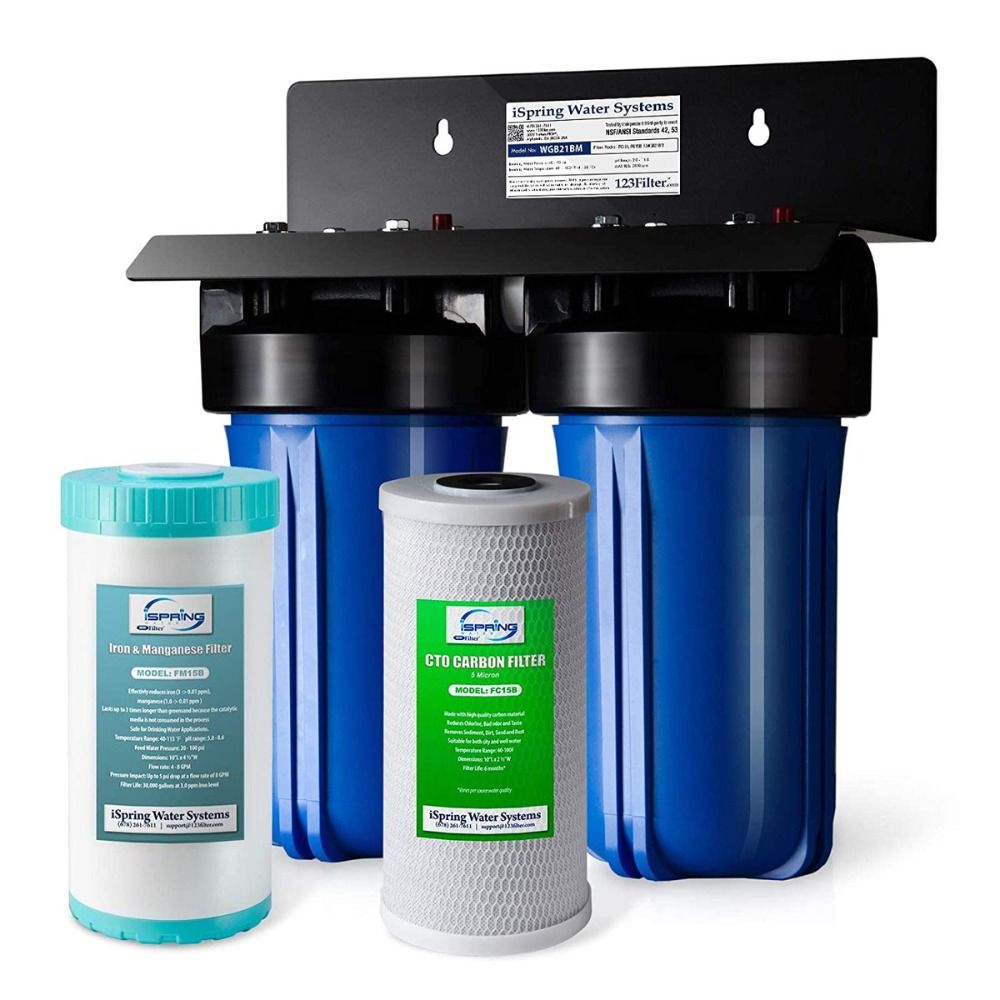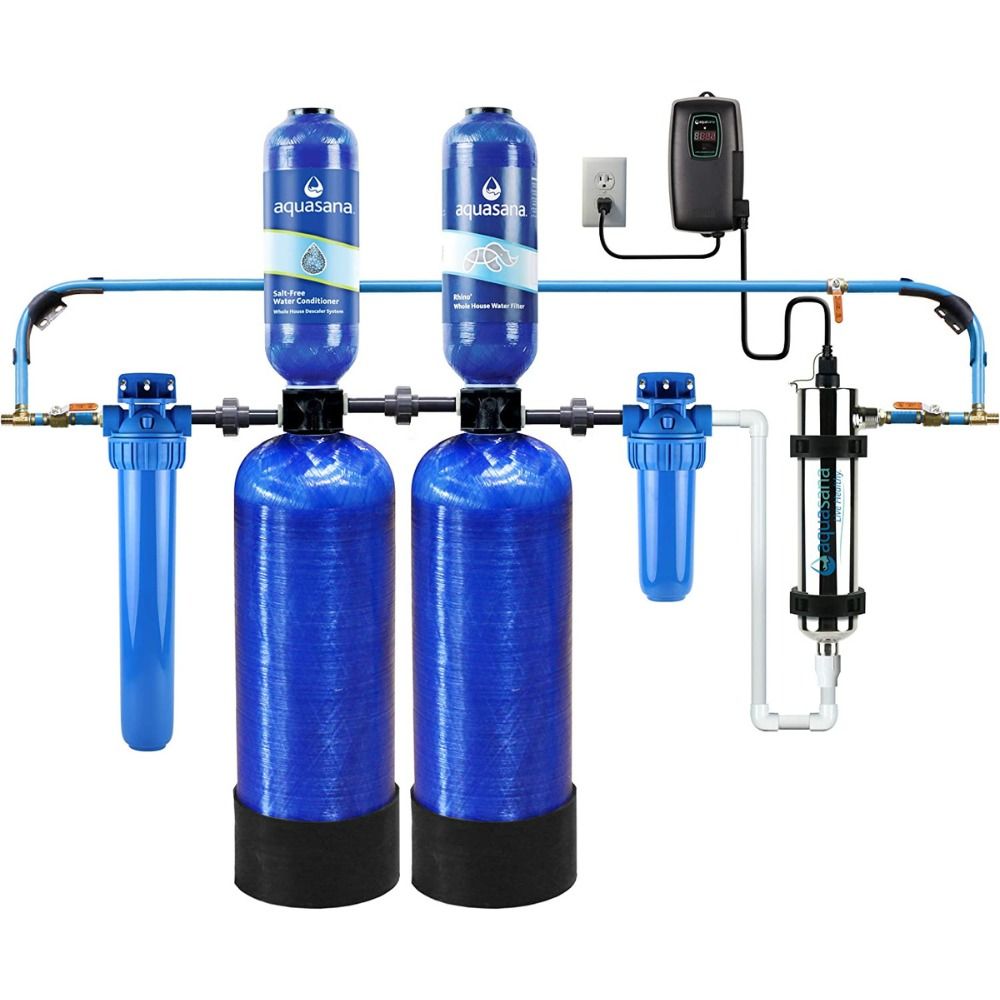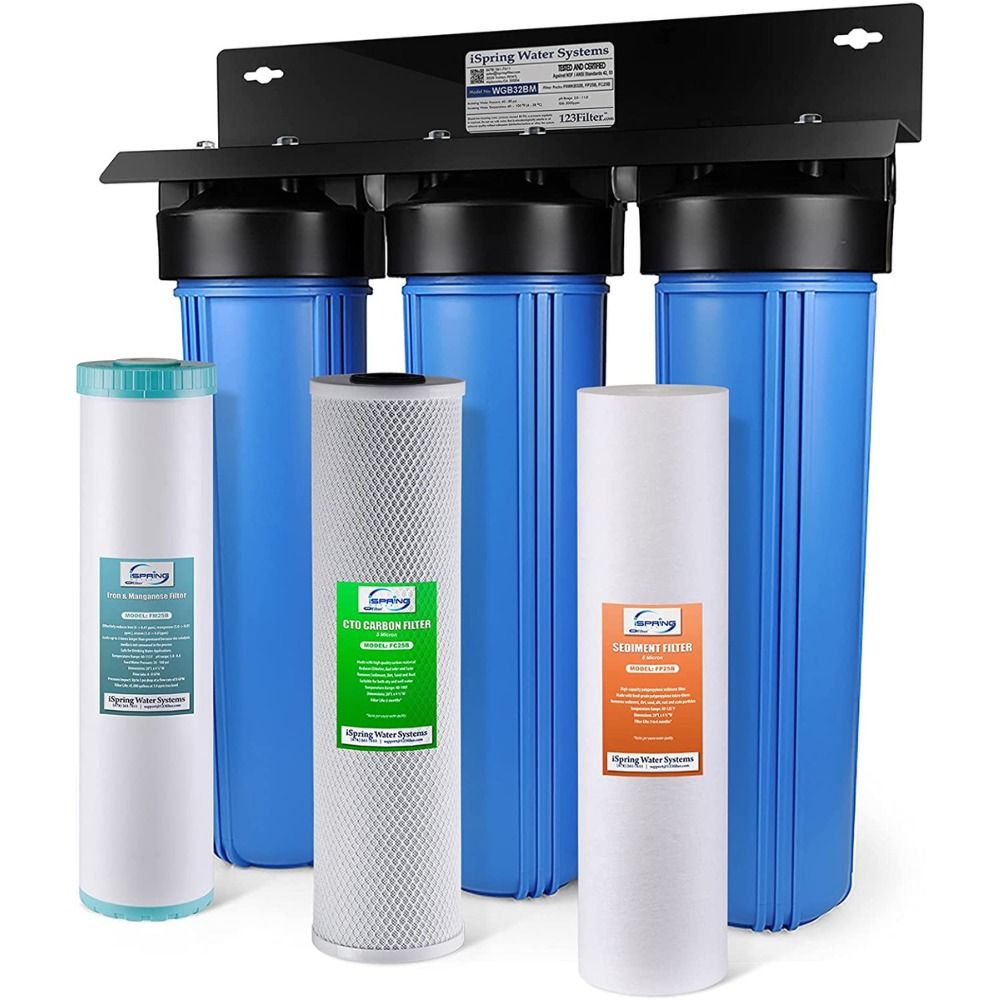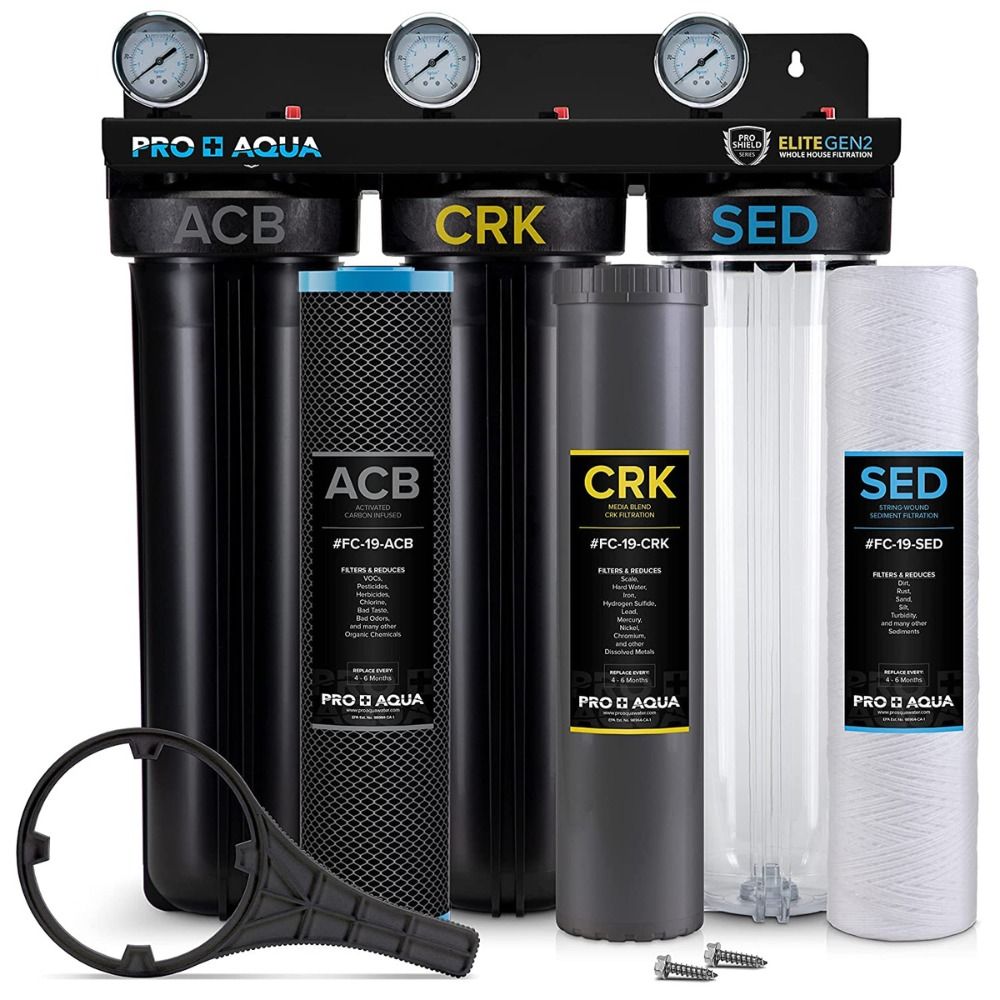Do you have well water that's full of iron?
Not only is iron in your well water not ideal, but it can also be detrimental to your health and home. But don’t worry – there are solutions!
With an iron filter for your well water, you can dramatically reduce the amount of this element in the H20 coming from underground.
An Iron Filter for Well Water treatment doesn't just do its job quickly and effectively – it does so without breaking the bank!
Plus, with a range of sophisticated features like automatic backwashing technology and customizable settings to fit any budget or lifestyle choice, these filters offer outstanding performance at an affordable price.
How We Choose
Iron in well water can cause orange or yellow staining on fixtures, damage appliances, and create an unpleasant metallic taste.
If you're like most people, you probably don't even realize that your well water has high levels of iron until it starts causing problems. By that time, it might be too late to do anything about it without spending a lot of money.
We've done the research for you and found the best iron filters for your well water.
Reason For Our Choice
Introducing the Aquasana Whole House Well Water Filtration System – perfect for optimizing your water’s flavor and taking it to the next level! And that’s not all—installing is simple, and its value for money will surprise you.
This impressive iron filtration system saves you twice as much compared to other brands on purified water for 500,000 gallons or 5 years.
Plus, no draining or back flushing is needed!
You won’t have to compromise on quality when you purchase an Aquasana Rhino system either: the unique up-flow, dual tank design increases water contact time with contaminant-grabbing media and prevents clogging or media channelling.
And what's more, it easily allows you to change pre and post-filters every 2 months for the best filtration and flow rate.
What You Should Know
If you're looking for the highest quality water filtration technology, look no further! The Carbon & KDF system not only removes 97% of chlorine from your water, but it can also reduce organic chemicals like pesticides and herbicides as well as VOCs.
You don't have to worry about poor flow rate either - this system allows for up to 14.7 gallons per minute without sacrificing performance!
Plus, there's no need for salt or other harsh chemicals in this Scale Control Media (SCM) system designed to maintain healthy minerals in your water.
The kit includes a filter tank, conditioner tank, pre-filter, post-filter and all necessary fittings and valves.
Reason For Our Choice
Introducing the iSpring Whole House Water Filter System – the perfect way to keep your family and household appliances safe from all the debris, rust, and other contaminants in your water. This filter is easy to install and comes with incredible tech support so you can always get help when you need it.
Experience pure serenity as your water comes out of the tap crystal clear and deliciously flavored. You no longer have to worry about iron and manganese, since this whole house filter will block them out completely. Best of all, our special catalytic media makes the filter last up to three times longer than other competitive iron removal systems on the market!
Let us give you absolute peace of mind knowing that our excellent customer service is always here for any questions or concerns that may arise. Since we truly care about providing superior filtration solutions, we’ll make sure you experience nothing but a top-notch product each time you use our filter system.
What You Should Know
It's time to feel secure about the water that you're drinking! With two amazing high-capacity filters, you'll be able to enjoy clean and fresh water for up to a full year.
The first stage polypropylene sediment filter is designed for maximum efficiency by filtering down to an incredible 5-micron level, ensuring that your water is free from unwanted particulates.
The second stage carbon block filter is made of premium coconut shell carbon for super effective filtration and extended filter life.
Plus, both filters have undergone rigorous testing from independent third parties so you can trust that they meet NSF/ANSI standards.
Reason For Our Choice
Welcome to the PRO+AQUA Elite Series GEN2 PRO – the perfect water filtration system for small to medium households with 1-3 bathrooms, both on well and city water.
The PRO+AQUA Series is constructed with pro-grade materials, top-notch components, and industry-standard pipe threading making it resilient and durable. You won't have to worry about regeneration, backwash, draining or electricity with this easy-to-install product as it requires minimal maintenance.
Plus you get excellent performance at a value price point—it’s an unbeatable purchase!
The highly efficient stainless steel pressure gauges ensure that the system lasts even after warranty expiration due to their ability to monitor the system.
All of these features make the PRO+AQUA Elite Series GEN2 PRO - a good choice for clean, reliable water filtration in a cost-effective package.
What You Should Know
Get the protection you need for your home and appliances with the CRK Filter.
An advanced combination of media absorbs heavy metals, odors, and other dangerous impurities, as small as five microns.
The filter is densely filled with activated coconut shell carbon, providing an expansive surface area to capture sediments such as rust, dust, silt, and dirt that cloud or muddy water - prolonging the life of stage 2 and 3 filters. All are neatly tucked away in a clear housing for easy maintenance and monitoring.
Plus, it helps inhibit iron bacteria and algae growth which can extend the life of all household appliances and provide you with peace of mind.

iSpring WGB21BM 2-Stage Whole House Water Filtration System
High-quality iron removal system
Reason For Our Choice
Introducing the iSpring WGB21BM—the versatile and easy-to-install whole-house water filtration system! This high-quality iron removal system comes pre-assembled onto a mounting bracket so that you can have it installed with no hassle. And when it's time for a filter change, we include a wrench so that everything is quick and easy.
So whether you're needing it for your home, or looking to upgrade your RV, this is the perfect solution.
We want you to feel confident when buying our products—which is why we back them with a 30-day money-back guarantee, plus a 1-year warranty and an extended manufacturer warranty upon warranty registration.
What You Should Know
This featured 2nd stage filter is the perfect tool for effectively reducing iron and manganese, allowing you to achieve great taste and odor in your water.
Made with high-quality coconut shell carbon and featuring highly compact fabrication tech, our 1st-stage CTO filter (FC15B) will deliver outstanding results by removing over 90% of chlorine, cloudiness, bad taste, and odors.
And because its catalytic media isn't consumed in the process, it offers filter life up to three times longer than its greensand counterparts.
FAQs
Iron in well water can cause stained laundry, dishes, and fixtures. It can also make your water taste bad.
If you're like most people, you probably don't even know that your well water has iron in it. And if you do know, you may not know what to do about it.
Iron filters for well water are the answer.
These filters use activated carbon to remove the iron from your water, giving you clean, clear, great-tasting water for drinking and cooking.
Below are the frequently asked questions with answers to make decisions easier.
Can you filter iron out of well water?
Yes, you can filter iron out of well water. The two main methods of doing this are chemical oxidation and filtration.
Chemical Oxidation: Chemical oxidation is a method of removing iron from well water using chemicals such as chlorine, hydrogen peroxide, and oxygen to oxidize the ferrous form of iron (Fe2+) into the ferric form (Fe3+). This process causes the iron particles to clump together so they can be filtered out more easily through a sand or carbon filter. However, this method may also lead to increased stain potential in fixtures due to adding manganese and other elements present in the water supply.
Filtration: Filtration is another effective way of removing iron from your well water. This involves passing your well water through a special media filter that contains either granular ferric hydroxide or greensand for removing dissolved ferrous metals like iron from your home’s drinking water supply. The filter media has pores that are small enough for only the tiny particles like rust and dirt created by the corrosion process caused by naturally occurring minerals present in groundwater sources to pass through leaving clean safe potable drinking water free from contaminants behind. The well water filtration system will require frequent backwashing with clean fresh chlorinated potable water which helps remove accumulated contaminants while preventing any changes in taste or smell associated with untreated contaminated unfiltered mineralized groundwater sources so that you always have fresh clean great-tasting drinking tapwater right at home!
How do you remove iron from well water cheaply?
Most well water contains some amount of iron, which can be identified through a lab test. Unfortunately, high levels of iron can cause problems such as staining on clothes and fixtures, bad taste and smell in drinking water, or even the clogging of plumbing fixtures.
Removing iron from well water is possible with several different methods that are generally inexpensive and easy to do.
The most common way to remove harmful amounts of iron from well water is through a method known as aeration filtration. Aeration filters work by passing the contaminated water into an aerator tank where the air is injected: this causes oxygen bubbles to become trapped in the particles and ferrous (dissolved) iron form will oxidize into a floating ferric (precipitated) form that contains particulate matter. This removed material then settles at the bottom of the filter tank while clean water flows out through an outlet valve at the top.
In addition to using aeration filters, householders can also use chemical precipitation for reducing moderately high levels of dissolved iron in their tap water supply. Chemical precipitation involves adding certain chemicals such as Sodium Hydroxide or Potassium Permanganate onto contaminated wells until pH level changes occur; this helps break down any insoluble matter particles suspended within your tapwater so they settle out leaving clean drinking water behind that has reduced levels or even no detectable traces of Iron content left behind when pH values return down again after treatment procedures are finished up correctly each time too!
Besides chemical precipitation processes & aerators treatments for removing Iron from Well waters, there are also other technologies available like Chlorine Injection systems (CI), Water Softeners Systems & Ultraviolet Light disinfection equipment too - all these methods' cost varies according to affordability/budgeting considerations but they’re all fairly simple techniques that have been proven effective over time depending on what kind analysis & results you get before starting with either one choice method mentioned previously here today... Good luck!
How long does an iron filter last?
Iron filters are designed to last for many years if they are properly maintained. The average lifespan of an iron filter is 8–10 years, however, this can vary widely based on several factors.
The most important factor that affects the life of an iron filter is the amount and type of suspended particles in your water supply. If your water contains more sediment or other particulate matter, then you may need to replace your filter more frequently than someone who has cleaner water with fewer particulates.
Maintaining your iron filter is also very important; it should be inspected yearly and cleaned as needed according to the manufacturer's instructions. This will help ensure maximum lifespan from your investment as well as provide greater protection from contaminants in your home’s drinking water supply.
In addition to extending the overall lifespan of a filter, proper maintenance helps keep it running at its peak performance level so there aren't any lapses in filtration quality or effectiveness when filtering out dissolved iron particles from reaching residential tap water supplies.
Finally, there are some types of pre-filters which can be installed before the main filtration system that will help increase its performance and longevity by removing larger particles before they reach the main filtration stage - these too should be regularly replaced as directed by their specific manufacturer guidelines.
Will a charcoal filter remove iron?
Yes, a charcoal filter removes iron from water. Charcoal filters contain activated carbon which is highly absorbent and capable of binding to a wide variety of contaminants. This includes dissolved metals such as iron, copper and lead.
The micro-pores in the charcoal filter will trap these metal ions, preventing them from entering household water supplies.
These types of filters also use catalytic media to help break down chlorine molecules as they pass through the filtering media. The result is fresh, clean drinking water that contains little or no trace amounts of unwanted contaminants like iron.
In addition to improving taste and smell, unlike chlorine, using a granular activated carbon filtration system has numerous advantages when it comes to removing certain contaminants from your drinking water supply including those for heavy metals like iron and leads as well as organic compounds (VOCs) including pesticides and petroleum hydrocarbons).
Carbon filtration systems also work well in removing volatile organic chemicals (VOCs), pesticides, petrochemicals, trihalomethanes (THMs), phenols & other harmful elements commonly found in our municipal drinking source waters today.
When purchasing a charcoal filter for your home make sure you get one that includes both physical adsorptions along with chemical oxidation removal capabilities so you can ensure it's doing its job properly at all times while providing the safest drinking water possible!
Do I need a water softener to remove iron?
Yes, a water softener is necessary to remove iron from your water supply. Iron can have multiple negative impacts on your home and health if consumed in high concentrations over time. It can cause discoloration of fixtures, plumbing pipes and fabrics as well as leave a metallic taste in food cooked with it. Furthermore, high levels of iron consumption can lead to serious medical conditions such as anaemia and other digestive disorders.
Water softeners are specifically designed to target these problems associated with hard water. Using salt or potassium chloride-based processes known as ion exchange, the particles responsible for causing hard water pass through a resin-based filter where the magnesium and calcium ions that makeup hardness are exchanged for sodium or potassium ions which then separate into the wastewater leaving behind clean drinking water free from any traces of iron or other harmful contaminants.
Additionally, when used properly these iron removal systems do not use any electrical energy so it's cost-effective and doesn't burden you with expensive utility bills every month unlike most other systems used for the treatment of hardening elements like chlorine & chloramines etc.
It’s important to know that while using a water softener helps make drinking water safer by removing potential contaminants like heavy metals present in your tapwater; it may also change its taste which may not be desirable depending on personal preferences. So if you’re looking at installing one think carefully about how much impact these changes may bring before investing in one expensively priced device!
How do I know if I need iron filters?
Identifying the need for an iron filter can be challenging, but it is an important step in ensuring your home's water supply remains safe and free of unwanted contaminants. Iron is one of the most common inorganic minerals found in water and can cause taste, odor, and staining problems if left unchecked. That’s why having an iron filter installed in your home or business can be so beneficial.
But how do you know if you need one? Generally speaking, homeowners that rely on well water should consider investing in a house iron filter if their water contains more than 0.3 parts per million (ppm) of dissolved iron content. This number will vary depending on local government regulations regarding drinking water safety standards as they relate to iron levels, however, 0.3 ppm is a good starting point when determining whether or not additional filtration may be needed to improve drinking quality or reduce potential health risks related to elevated levels of this metal mineral compound.
Testing your well water for total dissolved solids (TDS), including specific measurements for types of solids such as calcium hardness, magnesium hardness, manganese levels and copper concentrations is also an easy way to determine whether there could be a benefit from installing a specialized filtration system such as an aerator or reverse osmosis unit which could help further reduce levels of potentially dangerous compounds within municipal tap lines or private wells without impeding overall flow rate throughout plumbing fixtures connected directly with each unique source point used by property owners across the country daily.
If any tests return results indicating higher than average readings for the presence of some form of solid material such as those listed above then steps must be taken right away to begin investigating what sort(s)of specialized equipment would improve overall quality while still allowing adequate water pressure attainment rates meeting all local building codes requirements before engaging any installer-technician working within this specific subsector industry/business domain today!
Why does my well water have so much iron?
The presence of iron in water is a very common occurrence, especially in well water. Iron can enter into the groundwater supply through natural mineral deposits or from industrial pollutants if it is present in the area.
A high concentration of iron in your well water may be caused by several different factors. The most common cause of high levels of iron within your well water is naturally occurring minerals found within rocks and soil that are exposed to groundwater sources. These minerals release trace amounts of iron into the surrounding environment which then accumulates over time until it reaches your home's drinking supply. In areas with higher concentrations of naturally occurring mineral deposits such as near limestone cliffs, this accumulation can occur quickly and result in higher levels within your drinking supply than normal.
Excess industrial activity may also contribute to higher concentrations of iron being introduced into ground-water supplies if these activities involve utilizing materials containing excessive levels of metals or other chemicals that could leach out from their source material and find their way into nearby bodies like streams, rivers and eventually wells used for drinking supplies where they accumulate with time.
Additionally, some municipal treatment centres could inadvertently add excess ferrous (iron) compounds during sanitation processes increasing when delivered via pipes directly to homes relying on this method for their household supplies.
Every municipality usually conducts testing regularly ensuring safe levels are maintained but often there are still bound to be some trace elements found even when following industry standards making it even more important to filter them out before consumption as they can cause health issues over extended periods.
The Right Iron Filter For Your Well Water
We hope that our findings have helped you in your search for an Iron removal Filter that fits your needs. We know that finding the best product for your home can be a difficult task, but we are confident that with our help, you will be able to find the perfect filter for your well water.
Thank you for taking the time to read our article and we hope that it was informative and helpful.
Please click the blue button below to check the price and information about the Iron removal Filters featured in this article.












